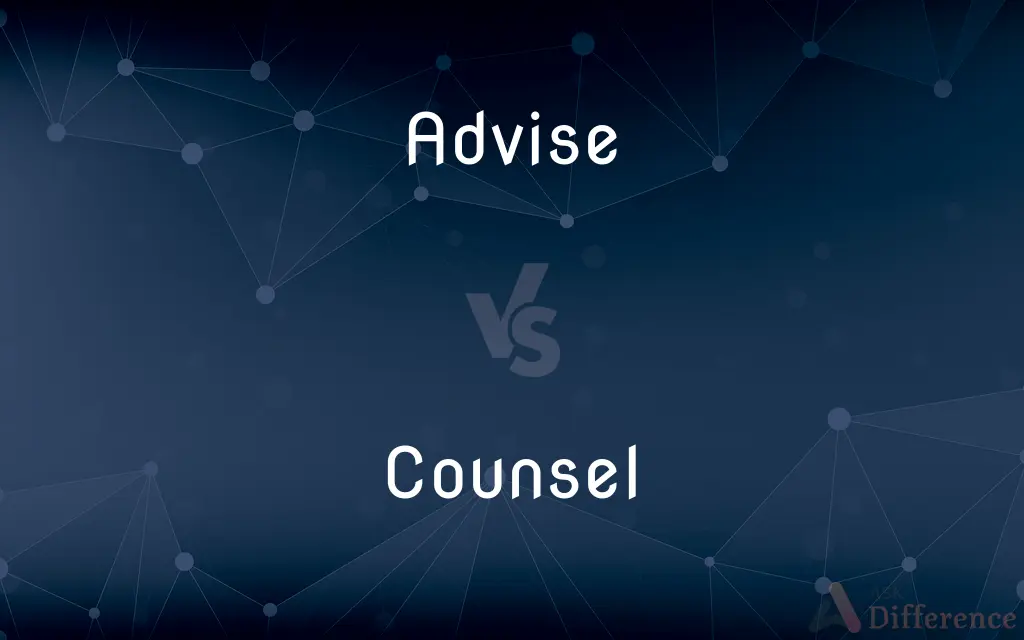Advise vs. Counsel — What's the Difference?
Edited by Tayyaba Rehman — By Fiza Rafique — Updated on May 5, 2024
"Advise" is the act of giving a recommendation about what someone should do, whereas "counsel" involves providing expert guidance or advice, often in a formal setting.

Difference Between Advise and Counsel
Table of Contents
ADVERTISEMENT
Key Differences
When you advise someone, you are suggesting a particular action or decision, typically based on your own knowledge or opinion, whereas when you counsel someone, you are often providing specialized, considered guidance in a professional context.
Advise is generally less formal and can be used in casual or everyday situations, such as a friend advising another on what to wear; on the other hand, counsel is often used in more serious or professional scenarios, like a lawyer providing legal counsel to a client.
The verb advise implies a direct communication aimed at influencing someone's decisions or actions, while counsel may involve a deeper engagement with the person's situation, offering not just advice but also support and strategy.
People often advise on a wide range of topics without needing special expertise, whereas counselors are usually experts in a specific field, such as law, psychology, or finance.
While anyone can give advice, offering counsel typically implies that the counselor has a duty of care toward the person they are helping, highlighting a higher level of responsibility and trust in the relationship.
ADVERTISEMENT
Comparison Chart
Definition
To give suggestions for action.
To give expert advice, especially formally.
Formality
Less formal, can be casual.
More formal, often within professional scope.
Expertise
Does not necessarily require expertise.
Typically requires expertise in a specific area.
Relationship
Can occur in casual or informal settings.
Implies a professional and trusting relationship.
Purpose
To influence decision-making.
To guide strategically, often with support.
Compare with Definitions
Advise
To offer guidance based on one's own opinion or experience.
She advised waiting until spring to plant the garden.
Counsel
To guide with care and consideration.
As a therapist, she counsels patience to her clients.
Advise
To give recommendations about what someone should do.
I advised him to save money for future expenses.
Counsel
To give formal advice or guidance, especially by a professional.
She sought counsel from her attorney before signing the contract.
Advise
To suggest a particular action or decision.
The consultant advised moving forward with the merger.
Counsel
To provide expertise and support in decision-making.
He provides counsel on matters of corporate law.
Advise
To inform about a fact or situation.
He advised that the road ahead was closed.
Counsel
To advise as a part of a job or role, implying responsibility.
The school counselor counseled students on their career options.
Advise
To counsel someone informally.
As a mentor, I advise my mentees regularly.
Counsel
To recommend a course of action in a professional capacity.
The financial advisor counseled investing in bonds.
Advise
Offer suggestions about the best course of action to someone
We advise against sending cash by post
I advised him to go home
He advised caution
Counsel
A counsel or a counsellor at law is a person who gives advice and deals with various issues, particularly in legal matters. It is a title often used interchangeably with the title of lawyer.
Advise
To offer advice to; counsel
Advised him to study abroad.
Advised that we should reconsider the idea.
Counsel
The act of exchanging opinions and ideas; consultation
Joined in counsel with colleagues before deciding the issue.
Advise
To recommend; suggest
Advised patience.
Counsel
Advice or guidance, especially as solicited from a knowledgeable person.
Advise
To inform; notify
Advised us that the meeting had been postponed.
Counsel
Private, guarded thoughts or opinions
Keep one's own counsel.
Advise
To offer advice
How would you advise?.
Counsel
A lawyer or group of lawyers giving legal advice and especially conducting a case in court.
Advise
To take counsel; consult
She advised with her associates.
Counsel
To give counsel to; advise
Counseled us to be prudent.
Advise
(transitive) To give advice to; to offer an opinion to, as worthy or expedient to be followed.
The dentist advised me to brush three times a day.
The lawyer advised me to drop the case, since there was no chance of winning.
Counsel
To recommend
Counseled care in the forthcoming negotiations.
Advise
(transitive) To recommend; to offer as advice.
The dentist advised brushing three times a day.
Counsel
To give or take advice. See Usage Note at council.
Advise
(transitive) To give information or notice to; to inform or counsel; — with of before the thing communicated.
We were advised of the risk.
Counsel
The exchange of opinions and advice especially in legal issues; consultation.
Advise
(intransitive) To consider, to deliberate.
Counsel
Exercise of judgment; prudence.
Advise
To look at, watch; to see.
Counsel
Advice; guidance.
Advise
To consult (with).
Counsel
Deliberate purpose; design; intent; scheme; plan.
Advise
To deliver judgment after a case has been reserved for further consideration.
Counsel
A lawyer, as in King's Counsel (KC) or Queen's Counsel (QC).
Advise
Misspelling of advice
Counsel
(transitive) To give advice, especially professional advice, to (somebody).
The lawyer counselled his client to remain silent.
Psychiatrists, psychologists, social workers and other mental health professionals counsel clients.
Advise
To give advice to; to offer an opinion, as worthy or expedient to be followed; to counsel; to warn.
Counsel
(transitive) To recommend (a course of action).
I would counsel prudence in this matter.
Advise
To give information or notice to; to inform; - with of before the thing communicated; as, we were advised of the risk.
Bid thy master well advise himself.
Counsel
Interchange of opinions; mutual advising; consultation.
All the chief priest and elders of the people took counsel against Jesus, to put him to death.
Advise
To consider; to deliberate.
Advise if this be worth attempting.
Counsel
Examination of consequences; exercise of deliberate judgment; prudence.
They all confess, therefore, in the working of that first cause, that counsel is used.
Advise
To take counsel; to consult; - followed by with; as, to advise with friends.
Counsel
Result of consultation; advice; instruction.
I like thy counsel; well hast thou advised.
It was ill counsel had misled the girl.
Advise
Give advice to;
The teacher counsels troubled students
The lawyer counselled me when I was accused of tax fraud
Counsel
Deliberate purpose; design; intent; scheme; plan.
The counsel of the Lord standeth forever.
The counsels of the wicked are deceit.
Advise
Give information or notice to;
I advised him that the rent was due
Counsel
A secret opinion or purpose; a private matter.
Thilke lord . . . to whom no counsel may be hid.
Advise
Make a proposal, declare a plan for something
Counsel
One who gives advice, especially in legal matters; one professionally engaged in the trial or management of a cause in court; also, collectively, the legal advocates united in the management of a case; as, the defendant has able counsel.
The King found his counsel as refractory as his judges.
The players can not keep counsel: they 'll tell all.
Counsel
To give advice to; to advice, admonish, or instruct, as a person.
Good sir, I do in friendship counsel youTo leave this place.
Counsel
To advise or recommend, as an act or course.
They who counsel war.
Thus Belial, with words clothed in reason's garb,Counseled ignoble ease and peaceful sloth.
Counsel
A lawyer who pleads cases in court
Counsel
Something that provides direction or advice as to a decision or course of action
Counsel
Give advice to;
The teacher counsels troubled students
The lawyer counselled me when I was accused of tax fraud
Common Curiosities
What is an example of a situation where you might advise rather than counsel?
Advising a friend on simple everyday decisions, like choosing a restaurant, whereas counseling would be more appropriate for significant life decisions, such as career planning.
Is advising always informal?
Not always, but it is generally less formal than counseling and can occur in both casual and serious contexts.
Do you need a license to counsel someone?
In many fields, such as law, health, and psychology, a professional license is required to offer counsel.
Which is more formal, advice or counsel?
Counsel is generally more formal and structured.
What responsibilities does a counselor have that an advisor might not?
Counselors often have ethical and legal responsibilities to their clients, particularly in fields like law and psychology.
Can anyone counsel another person?
Technically, anyone can offer counsel, but it typically implies expertise and a professional relationship.
What is the difference between advising and counseling?
Advising is offering suggestions or recommendations, while counseling involves providing specialized guidance, often in a professional setting.
How do the outcomes of advising and counseling differ?
The outcomes can vary widely, but counseling typically aims for deeper, long-term solutions and personal development, whereas advising might target immediate or short-term decisions.
Can a counselor also advise?
Yes, counselors often provide advice as part of their counseling.
Is it possible to receive bad counsel?
Yes, just as with advice, the quality of counsel depends on the expertise and integrity of the counselor.
Share Your Discovery

Previous Comparison
Mahogany vs. Teak
Next Comparison
Autopolyploidy vs. AllopolyploidyAuthor Spotlight
Written by
Fiza RafiqueFiza Rafique is a skilled content writer at AskDifference.com, where she meticulously refines and enhances written pieces. Drawing from her vast editorial expertise, Fiza ensures clarity, accuracy, and precision in every article. Passionate about language, she continually seeks to elevate the quality of content for readers worldwide.
Edited by
Tayyaba RehmanTayyaba Rehman is a distinguished writer, currently serving as a primary contributor to askdifference.com. As a researcher in semantics and etymology, Tayyaba's passion for the complexity of languages and their distinctions has found a perfect home on the platform. Tayyaba delves into the intricacies of language, distinguishing between commonly confused words and phrases, thereby providing clarity for readers worldwide.
















































